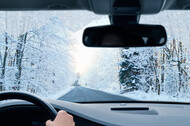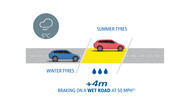
Tips & Advice for Car, SUV & Van tyres
For a long time, choosing tyres was a simple process - summer tyres for the summer and winter tyres for the winter.
Today, however, all season tyres offer a whole new range of possibilities, and it is not always easy to know what’s the best option for you. This is where Michelin comes in. Whether you’re thinking of going for summer or all season tyres, we’re here to give you all the information you need to help make the right decision.
Summer tyres
Designed to guarantee optimal performance in temperatures higher than 7°C, summer tyres perform best on dry and wet roads and are particularly useful in places where temperatures often reach over 35°C for occasional or even prolonged periods of time.

(1) Average difference in the braking distance of a winter tyre compared to a summer tyre. Braking distance on a wet surface from 50 to 0 mph. TUV SUD 2013 tests, using 205/55 R15, conducted betwwen 4C and 6C.
The problem with these tyres is that the rubber hardens once the temperature starts to fall below 7°C, rendering them less effective in winter, especially on wet ground.
As a result, if you drive with summer tyres in cold wintery conditions, you are putting yourself at risk. This is particularly dangerous if you find yourself driving in snow with summer tyres on your vehicle, as your braking distance is generally two times longer than if you had certified winter tyres.

(2) Average difference in the braking distance of a winter tyre compared to a summer tyre. Braking distance on a snowy surface from 31 to 0 mph. TÜV SÜD 2013 tests, using 205/55 R16, conducted between -4°C and -6°C.
All season tyres
All season tyres, or 4 season tyres as they are also commonly referred to, are hybrid tyres which are as comfortable driving in -10°C as they are in 30°C. Their secret? They combine the features of both summer and winter tyres, allowing you to safely drive in dry and wet conditions, in winter and summer, as well as on snow.
Michelin's all season tyres are 3PMSF certified and this is what allows them to confirm their good winter performance, particularly on snow.
This is the key benefit of all season tyres over summer tyres, as although they are not quite as effective as a winter tyre (which remain the ultimate snow tyre), all season tyres guarantee mobility and safety in the majority of snowy conditions. This advantage does, however, have a downside. When temperatures go above 7°C, even the best all season tyres have a slightly greater braking distance, both on wet and dry ground, than that of summer tyres.

Relative performance of MICHELIN’s summer , winter and all season tyres

The notes reflect the level of indicative performance of the tyres being compared.
Summer tyres
The MICHELIN Primacy 4+ and Pilot Sport 5 summer tyres perform best on dry and wet roads during hot weather. They have an excellent lifespan, as can be expected from the MICHELIN brand.
All-season tyres
The MICHELIN CrossClimate 2 tyres are an all season tyre which perform well in both summer and winter, even in snow. Their durability is on par with that of summer tyres, making them the leader in this category.
Summer VS all season tyres: what to choose?
The main consideration when buying new tyres is the kind of driving conditions you are likely to encounter with your vehicle.
Here is a diagram that can help you choose:

If you live in an area where winters are mild, temperatures rarely fall below 7°C and you never encounter snow-covered roads, then summer tyres are without a doubt the best option for you.
If, however, you live in a region where temperatures often fall significantly below 7°C and where you are faced each winter with several days of travel on snow-covered roads (local snowfall, trips to ski resorts, occasional visits to family or friends in mountainous or snowy regions, etc.), then all season tyres will be the best choice for you.
Finally, if you regularly encounter snowy roads, or you live in or have to travel to areas which are difficult to access in winter (steep slopes, untreated roads etc.), then the best option for you will be to continue using summer tyres in summer and winter tyres in winter, which will require you to swap your tyres twice a year.
Find the right tyre
Enter your Reg, vehicle or tyre size
We're searching for your tire...
Wait few seconds we're processing your photo

